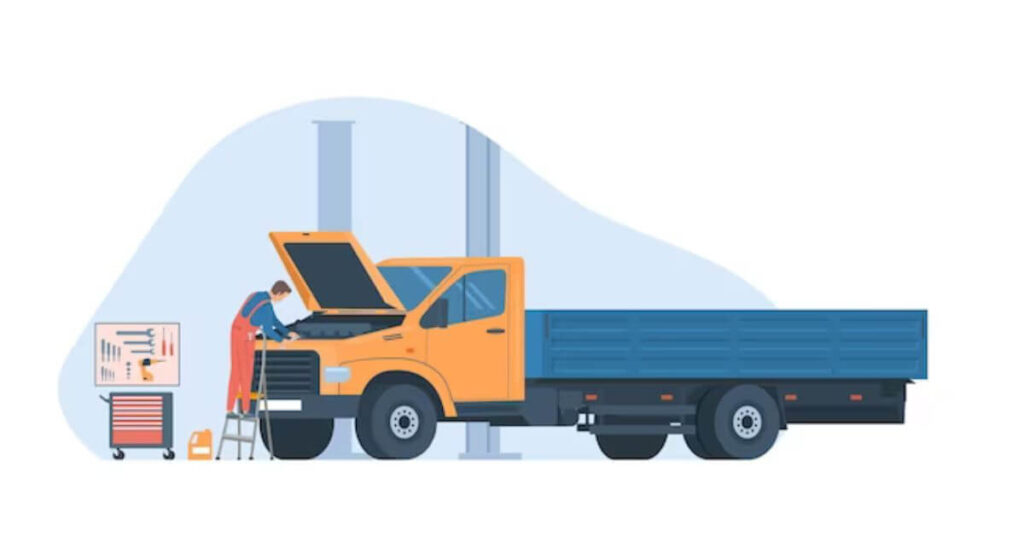Top 10 Truck Maintenance Mistakes and How to Avoid Them – Maintaining a truck is crucial for its longevity and reliability, whether you’re managing a fleet or simply keeping your vehicle in top shape.
Table of Contents
Top 10 Truck Maintenance Mistakes and How to Avoid Them
Despite best intentions, truck owners often make maintenance mistakes that can lead to costly repairs and unsafe driving conditions. Here’s a look at the top 10 truck maintenance mistakes and tips on how to avoid them.
1. Neglecting Regular Oil Changes
One of the most common mistakes is skipping regular oil changes. Oil lubricates the engine and keeps it running smoothly. Over time, oil breaks down and becomes less effective, leading to increased wear and tear on engine components. To avoid this mistake, follow the manufacturer’s recommendations for oil change intervals and use the correct type and grade of oil.
Tip:
Set a reminder based on mileage or time intervals to ensure timely oil changes. Regularly check the oil level and quality using the dipstick.
2. Ignoring Tire Maintenance
Tire maintenance is often overlooked, but it’s vital for safety and performance. Under-inflated or over-inflated tires can lead to uneven wear, reduced fuel efficiency, and dangerous blowouts. Regularly check tire pressure and tread depth, and ensure that your tires are aligned properly.
Tip:
Invest in a quality tire gauge and check your tire pressure at least once a month. Rotate your tires regularly to promote even wear.
3. Skipping Brake Inspections
Brakes are one of the most critical safety features on a truck. Ignoring brake inspections can lead to decreased stopping power, longer stopping distances, and potential brake failure. Have your brakes inspected at regular intervals and replace brake pads and rotors as needed.
Tip:
Listen for any unusual noises when braking, such as squealing or grinding, and address these issues promptly.
4. Overlooking Fluid Levels
Trucks rely on various fluids for proper operation, including transmission fluid, coolant, and brake fluid. Neglecting to check and top off these fluids can lead to overheating, transmission issues, and brake failures. Regularly inspect fluid levels and top them off as necessary.
Tip:
Keep an eye on the dashboard warning lights related to fluid levels and address them immediately if they come on.
5. Ignoring Air Filter Replacement
The air filter prevents dirt and debris from entering the engine. A clogged air filter can reduce engine performance and fuel efficiency. Replace your air filter according to the manufacturer’s recommendations or sooner if you drive in dusty conditions.
Tip:
Check your air filter during routine maintenance or if you notice a decrease in engine performance or fuel economy.
6. Neglecting Battery Maintenance
The battery provides the electrical power needed to start your truck and run various systems. A dead or weak battery can leave you stranded. Regularly inspect the battery terminals for corrosion and ensure that the battery is securely mounted.
Tip:
Have your battery tested annually, especially if it’s more than three years old. Replace it if you notice any signs of weakness.
7. Overlooking Cooling System Care
The cooling system keeps the engine from overheating. Neglecting the radiator and coolant system can lead to engine damage. Regularly check coolant levels and the condition of hoses and belts.
Tip:
Flush the coolant system according to the manufacturer’s recommendations, and inspect hoses for signs of wear or leaks.
8. Ignoring Exhaust System Issues
A damaged exhaust system can lead to increased emissions, reduced engine performance, and potential health hazards from carbon monoxide leaks. Inspect the exhaust system for leaks, rust, or damage and address any issues promptly.
Tip:
Listen for unusual noises from the exhaust system and check for any visible damage or rust.
9. Skipping Routine Inspections
Routine inspections help identify potential issues before they become major problems. Skipping these inspections can lead to unexpected breakdowns and costly repairs. Follow a regular maintenance schedule and address any concerns identified during inspections.
Tip:
Create a maintenance checklist and keep records of all inspections and repairs to ensure nothing is overlooked.
10. Ignoring Warning Lights and Alerts
Modern trucks come equipped with various warning lights and alerts to notify you of potential issues. Ignoring these warnings can lead to more serious problems and costly repairs. Pay attention to dashboard alerts and address them promptly.
Tip:
Familiarize yourself with the meaning of each warning light in your truck’s manual and take immediate action when an alert appears.
In Conclusion
Effective truck maintenance is crucial for ensuring your vehicle’s safety, performance, and durability. By steering clear of these common maintenance pitfalls and keeping up with routine checks, you can avoid expensive repairs and keep your truck operating smoothly. Consistent inspections, prompt oil changes, and a keen eye for detail are essential for enhancing your truck’s reliability and efficiency.
Additionally, proactive maintenance can help you avoid major issues and financial setbacks in the future. If you ever face a situation involving a truck accident, consulting a truck accident lawyer in Salt Lake City can provide valuable guidance and support.

Pradeep Sharma is a author the mind behind Techjustify, where I craft insightful blogs on technology, digital tools, gaming, AI, and beyond. With years of experience in digital marketing and a passion for tech innovation, I aim to simplify complex topics for readers worldwide.
My mission is to empower individuals with practical knowledge and up-to-date insights, helping them make informed decisions in the ever-evolving digital landscape.


